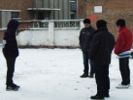Eye For Film >> Movies >> Winter Vacation (2010) Film Review
If America has its Jim Jarmusch, Finland its Aki Kaurismäki and Sweden its Roy Andersson, then China too has its very own deadpan exponent of emptiness and ennui. As well as being a painter, poet and novelist, Li Hongqi is a filmmaker who creates elegantly composed cinematic landscapes where the camera rarely moves, characters are silent as much as they speak, and boredom reigns supreme. Bleak and spare, his films would be deeply depressing were they not so absurdly funny.
Take his latest, Winter Vacation, set in an unnamed northern town that is all brutalist Soviet-era architecture and grey skies. Unfolding as a series of vignettes in long shot, it charts the last days of the holiday, as a group of aimless youngsters struggle to fill the longueurs with any sort of distraction – an ambition in which they are mostly unsuccessful. In the opening scene, one boy suggests paying a visit to the outdoor markets where a pretty, new out-of-town girl is rumoured to be working – only to be told by his friend, who had gone there earlier, that she is entirely ordinary looking. "It's just", he adds, "that she is a stranger" – which is almost enough to make her interesting in this place where nothing ever happens.

Still, things are even worse for the much younger Zhou Zhangxin, who is not even allowed by his grandfather to go play outside. Stuck in an apartment where the only thing showing on the television is Li's previous film Routine Holiday (2008), and where talking or even moving is met with the threat of a butt-kicking, Zhangxin declares that when he grows up he wants to be "an orphan". Meanwhile, Zhangxin's teenaged uncle Zhixin finds himself the unlikely centre of attention for his classmates. They gather at his house, seek his opinion on what to do on any given day, and even watch him sleep. "Why are you all looking at me?", he will eventually ask in exasperation. It is a question that serves as a challenge to us too. Why indeed?
"One day after another, it seems as if life never ends," observes one of Zhixin's friends, as the classmates sit outside on abandoned furniture under a light snow. For in Winter Vacation, life is presented as drab, repetitive and futile. It is a point exemplified by another of Zhixin's friends, Laowu, who dreams of settling with (and for) his "stupid and average-looking" girlfriend so that he can produce a kid like himself who will, in turn, produce another kid like himself. "It's the endless fruit of my loins," he explains. Laobu, on the other hand, wonders whether there is any real point in just "muddling along in school" and supposedly enhancing socialism by rote-learning his characters. "If", Zhixin comments, "you enter society with your mentality, you will only be a burden on the country."
Yet it is precisely the model of the new China that Li's film is quietly demolishing. In contrast to the nation's post-Olympics image of progress and prosperity, Winter Vacation depicts a grim, marginalised and backward part of the country, and a way of life dominated by hopelessness, neglect and resignation. In the film's final sequence, set on the first day back at school, the pupils are given an assignment on "how to be a useful person for society". The combined look of boredom and puzzlement on their young faces represents an eloquent answer of sorts to a question that in this setting has little meaning.
Featuring drily droll performances, ugly settings beautifully shot, and a soundtrack of endless ticking clocks and laid-back, pre-verbal warblings (from Zuoxiao Zuzhou and The Top Floor Circus), Winter Vacation earned itself the Golden Leopard at 2010's Locarno Film Festival - presumably for the magical way that it finds rib-tickling entertainment in utter tedium. Li's characters may never smile, but you will.
Reviewed on: 20 Oct 2010
















